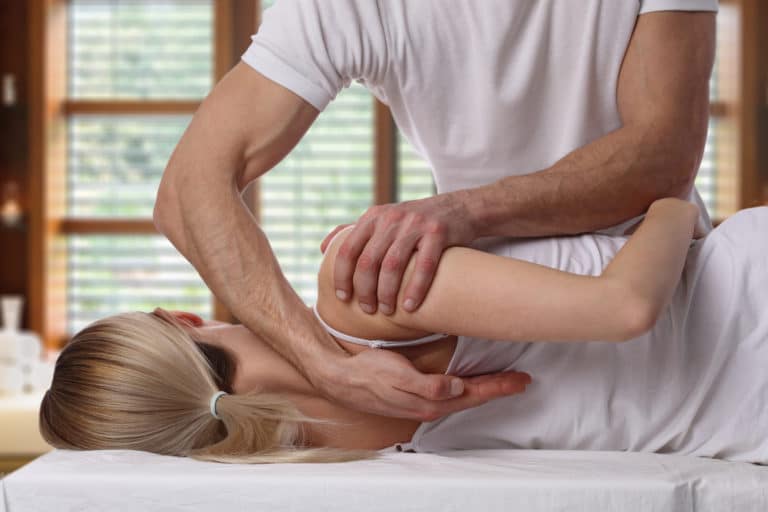Are you experiencing chronic back pain? Are you wondering if it’s time to see a back doctor in Central Florida? Orthopedic doctors specialize in problems with your musculoskeletal system. This could include your joints, bones, ligaments, or tendons. Here are some injuries that require the assistance of a specialist.
Herniated Disc
A herniated disc is a common back injury often caused by lifting heavy objects or twisting and turning while lifting. Sometimes, it can also be caused by a blow to the back in an incident like a car accident. Symptoms of a herniated disc include pain and numbness, particularly on a single side of your body. This pain could extend down your arms or legs and increase when you sit for a while. If you notice that your pain worsens when you’re sitting at a desk for too long, you may have a disc herniation. You may experience pain when you walk even short distances. Your pain could be increasing if you’re carrying something. You may even notice pain or tingling in the affected area. You’ll need to see an orthopedic surgeon, who will diagnose the back pain. They will perform a physical exam and look for signs of pain and discomfort. You may also have X-rays, CT scans, and MRI scans. Symptoms of a slipped disc can improve on their own, or they can worsen over time and cause permanent nerve damage. If you find that you can’t perform daily activities the way you used to, it may be time to see a doctor. Herniated discs can be treated with physical therapy. You’ll learn some stretches that help strengthen the area around your back. Your doctor may also recommend muscle relaxers or heat and ice. Most people experience relief from herniated discs with conservative treatment. In some cases, however, surgery may be required. It’s essential to see our doctor so you can begin treating the problem right away.
Muscle or Ligament Strain
Muscle strains are common in your back, shoulder, or hamstring. They often cause pain when you move. Signs of a muscle strain include a sudden onset of pain, a “knotted up” feeling, and muscle spasms. Your muscles may be stiff with a mild strain but still, feel flexible enough for you to use. With a more severe tear, you will have severe pain and limited movement. Often, the causes of muscle strains could be slipping, throwing something, or lifting something heavy. They tend to be more common in colder weather. Your doctor can help you diagnose the problem and offer solutions for back pain. These could involve rest, ice, and wrapping the area. Your doctor might also prescribe over-the-counter anti-inflammatory medication, which can help reduce your pain and swelling.
Bulging Discs
Bulging discs are caused by an outward swelling of fluid material from the discs in your spine. Symptoms include tingling in your fingers, arms, or shoulders. You might also find that you have difficulty walking or problems liting or holding things. Your orthopedist will be able to diagnose the condition through a full medical exam, X-rays, and a CT scan. Bulging discs are often treated with physical therapy and weight reduction. In some cases, your doctor may also recommend minor surgical techniques.
Arthritis
In some cases, osteoarthritis can affect your lower back. It may even lead to a narrowing of the space around your spinal cord, causing a condition known as spinal stenosis. This condition’s symptoms include tingling in your hand or arm, neck pain, or weakness in a foot or leg. Your doctor can help to diagnose the problem through digital imaging. Your doctor may treat back pain caused by arthritis with over-the-counter pain relievers, antidepressants, or anti-seizure drugs. They may also prescribe physical therapy that can help you build muscle strength, maintain spine flexibility, and improve your balance. In some cases, they may also recommend steroid injections or surgery.
Pinched Nerve
A pinched nerve can occur when there is too much pressure on your nerve by surrounding tissues. It can be caused by a herniated disc that puts too much pressure on the nerve root. Other causes include injuries or stress. Symptoms of a pinched nerve include numbness, a sharp aching or burning pain, muscle weakness, or feet that frequently “fall asleep.” Typically, pinched nerves will respond to conservative treatments, such as rest and over-the-counter pain relievers. In extreme cases, surgery is required to relieve the pain.
Spondylolisthesis
With spondylolisthesis, a bone in your spine slips forward and out of place. Causes could include herniated discs, stiff ligaments, or bone spurs. Symptoms of spondylolisthesis include numbness, weakness, and a lack of coordination. You may also experience a lack of bladder or bowel control. Your doctor will diagnose cervical spondylolisthesis through a series of tests that include neck X-rays, CT scans, and MRI’s. There will also be nerve function tests. Your doctor could recommend several treatments for your pain. These could include anti-inflammatory drugs, muscle relaxants, and antidepressants. A physical therapist could also be recommended to help you strengthen the muscles in your neck and shoulders. If all other treatments fail, you could be a candidate for surgery.
When It’s Time For Orthopedic Doctors
Orthopedic doctors can help you treat myriad back problems that can worsen with time. The right physician can prescribe treatment that can get you on the road to healing in no time. Don’t stop improving your spinal health now. For qualified orthopedic professionals in your area, contact us today.

